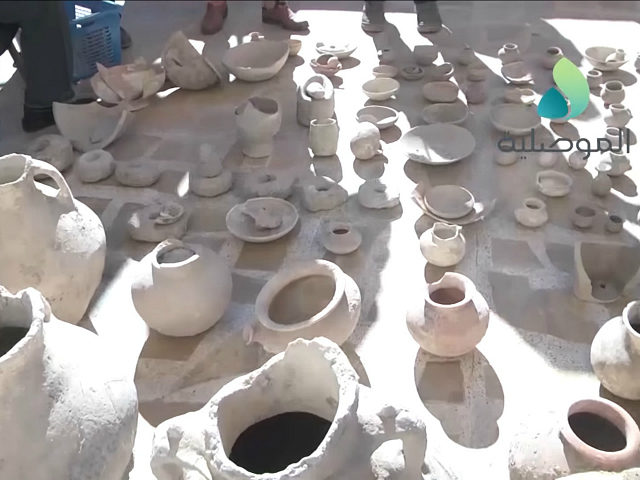Iraqi military officials uncovered a trove of over one hundred artifacts that experts have traced back to the Nimrud archaeological site at the former home of an Islamic State terrorist leader in eastern Mosul.
Nimrud, the capital of the ancient Assyrian empire, was once home to an extensive collection of artifacts dating back to the pre-Islamic empire. Reports from the site suggest that the Islamic State either destroyed or removed much of the content of the location — from its impressive stone gates to ancient pottery that sells at high prices on the black market.
The UK Telegraph confirms that the pieces were found in the home of a jihadi leader in eastern Mosul, which Iraqi authorities confirmed had been “fully liberated” earlier this week. Most of the artifacts were ancient pottery and vases, and the Telegraph cites Iraqi media as placing the original location of these pieces at Nimrud or “the nearby Nineveh Ruins site.”
The ancient Assyrian empire, for which Nimrud served as a capital, gave the nation Syria its name. The ethnic Assyrian community is currently largely Christian and has been under heavy persecution by the Islamic State for years.
The Telegraph also posted video from local television showing the items in question:
While the find will bring some hope to the archaeologists who dedicated their lives to protecting these historical items, Iraqi forces also confirmed the immense cultural destruction that Mosul has suffered in the over two years that it has been under Islamic State control. While Iraqi military leaders confirmed its recapture, they also confirmed that the ancient tomb of Jonah had indeed been destroyed, as news reports indicated in 2014. Voice of America confirmed with the forces involved that the tomb was not only destroyed but the terrorist group “dug several tunnels under it in search for artifacts.”
While no longer in control of the site, Nimrud itself will require extreme rehabilitation to return to its previous complete state. As the ancient Assyrian capital was host to a variety of thousand-year-old religious artifacts, including icons of ancient Pagan gods, the Islamic State destroyed all they could not sell. The terrorist group considers it an Islamic duty to destroy all “icons” that defy the alleged glory of Allah, and they have systematically targeted museums and archaeological sites for destruction. An archaeologist speaking to the Associated Press said she believed that only 40 percent of Nimrud could be recovered.
Other pivotal cultural sites the Islamic State has targeted for destruction include Mosul’s Alqush Museum, the city’s ancient gates, and the University of Mosul, which the terrorists converted into a bomb factory.
What the Islamic State has not destroyed, it has sold. Last year, Russia’s envoy to the UN presented a study that concluded the Islamic State was generating up to $200 million a year in black market sales of ancient artifacts. A year earlier, studies suggested that this profit was part of a larger $80-million-a-month haul for the Islamic State, including sales of drugs and plundered oil as well as the collection of the jizya (infidel tax) on non-Muslims trapped in Islamic State areas.
Iraqi authorities and their allies appear confident that they will defeat the Islamic State in Mosul soon. A coalition including U.S. flight support and ground aid from the Kurdish Peshmerga began the operation to eradicate the group from Iraqi’s second-largest city in October. Maj. Gen. Joe Martin, commander of coalition ground forces in Iraq, told the Kurdish outlet Rudaw earlier this week that the Islamic State was “on the run” and “crumbling.”
“Daesh has quickly collapsed and no one expected such collapse,” Iraqi Prime Minister Haider al-Abadi said on Tuesday. “The heroism of our security forces was behind Daesh’s defeat.”

COMMENTS
Please let us know if you're having issues with commenting.